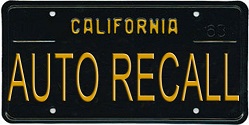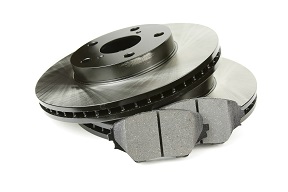 Now that the recall notifications have been blowing up, one after another, for months, fully 1 out of 7 cars in the country has been recalled and the media’s incredulous coverage of this fact has made the public, perhaps more than ever before, acutely aware of automobile safety.
Now that the recall notifications have been blowing up, one after another, for months, fully 1 out of 7 cars in the country has been recalled and the media’s incredulous coverage of this fact has made the public, perhaps more than ever before, acutely aware of automobile safety.
Independent repair shops and those in dealerships may have a unique opportunity to capture new customers, but this often comes down to convincing a car owner that repairs they didn’t know they needed are actually critical to their safety and to the reliability of their vehicle.
From Mechanic to Teacher in Less Than Sixty Seconds
Whether a customer is coming in for a free recall repair or because they hear some new squeak they didn’t like, once you’ve done your safety inspection and discovered a hazard that’s about to become a danger you shift into educator role. You’re good at it and since you’re sincerely trying to help your customer they usually believe you – whether they look under the hood or not – and they would, in a perfect world, give you the go-ahead to do the necessary work.
But it’s not a perfect world, and quite often a grateful customer who expected to pay a modest amount for a simple repair will turn into an agitated and defensive adversary when you tell him he should have a much more expensive repair – and that he needs to have it now.
When Money Equals Safety
You know he’s not actually questioning your integrity when he protests that “all I came in for was xyz” and implies you’re trying to pad your end of month reconciliation.
 You know the real problem is money. He budgeted for a small repair, and now he needs ten times as much. When people are short on money the last thing they want to do is admit it – especially when the thing they can’t afford is safety.
You know the real problem is money. He budgeted for a small repair, and now he needs ten times as much. When people are short on money the last thing they want to do is admit it – especially when the thing they can’t afford is safety.
Many savvy auto aftermarket owners and managers have relied upon various financing options to help them solve this problem. Rather than let the customer walk out in frustration, costing the business and perhaps setting the customer up for a much more expensive problem should the car break down, they will help them apply for a credit card with enough of a limit to cover the cost of the full repair.
What’s Up with GE Capital?
GE Capital is probably the most popular provider of this kind of credit for auto dealer and auto aftermarket shops, but there’s a lot going on with GE Capital these days. If you’ve ever read a book about management, it probably lavished praise on Jack Welch, the CEO who took GE from a $14 billion company to a $400 billion company largely by means of GE Capital, which at one point accounted for 30% of its parent company’s revenue. It got so huge that Congress designated it a “systemically important financial institution” and clapped additional regulatory oversight upon it.
But pre-Welch GE – which stands for “General Electric” – made its money by building things like industrial equipment and jet engines (and, yes, a lot of light bulbs). General Electric is now trying to get back to its industrial roots, so it is selling off GE Finance.
It remains to be seen if that will have any impact on your ability to offer support to your distraught customer, but as anyone who has used GE Capital knows, sometimes even the most reliable customers get rejected.
The reason is straightforward: since GE Capital usually provides approvals or denials in a couple of minutes, their system simply checks a few public records and then produces a standardized response. The main record they check, obviously, is the applicant’s credit score.
But credit scores change constantly. One payment mistake reported to the credit rating agencies can temporarily crater a person’s score. The score will come back up again sixty to ninety days later, assuming payments remain current, but if they applied for a GE Capital credit during that down period they may be rejected.
How Customers Use GE Money Credit Cards
GE doesn’t look at the individual as a person because it can’t. But we can learn a great deal if we look at the way people use the cards that are issued, which reveals that most people who get them are extremely responsible. Not surprisingly, since the vast majority of the public has a credit score between 600 and 750, those with scores in that range account for 74% of GE’s cardholders. Perhaps more surprisingly is the fact that less than one quarter of one percent of them is more than 60 days late, which makes them a fiscally responsible crowd.
But here’s the real kicker: sixty percent of them have an outstanding balance of zero, indicating that most people get the card for some purpose and then pay it off.
If you’re standing there in your shop with a customer who needs an expensive repair but who was just rejected, he may simply be in one of those temporary credit score valleys.
Automotive News Describes an Alternative
You might consider offering another alternative. As Automotive News reported recently, some auto aftermarket shop owners and managers, knowing that a credit card rejection may not really reveal much about a person’s creditworthiness, will offer an alternative to financing by having CrossCheck approve two to four checks to be deposited over the next thirty days – or sometimes, with advance approval, up to ninety days.
Since your customer may well have paid off a credit card in that same timeframe, letting them do it with interest-free checks may be an ideal solution to get the business and to take care of the customer. Some customers may prefer it. And CrossCheck doesn’t just check your customer’s credit score. Our analysis goes much deeper, and includes a proprietary database and algorithms based upon thirty years of experience.
As Automotive News reported, our “Multiple Check” service doubled repair revenue for one shop, not only because it closed the sale, but also because if CrossCheck approves a check with our guarantee service in place, you see no disruption in your cash flow. Learn more here.



